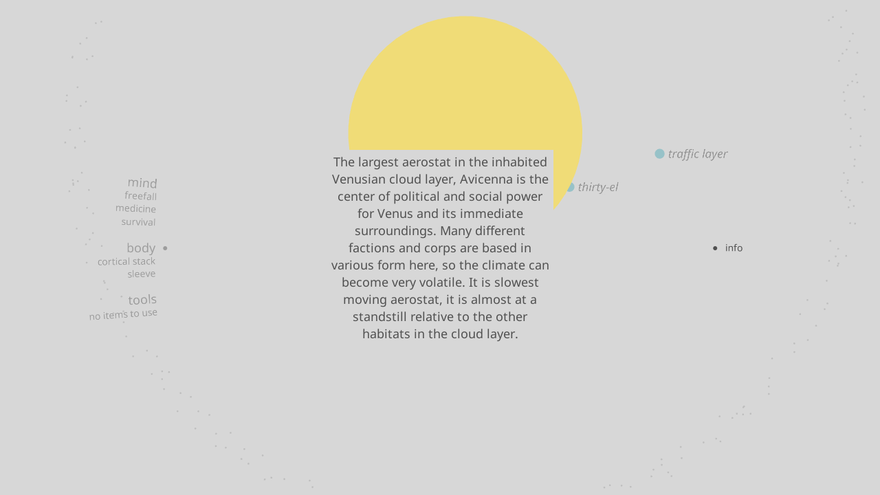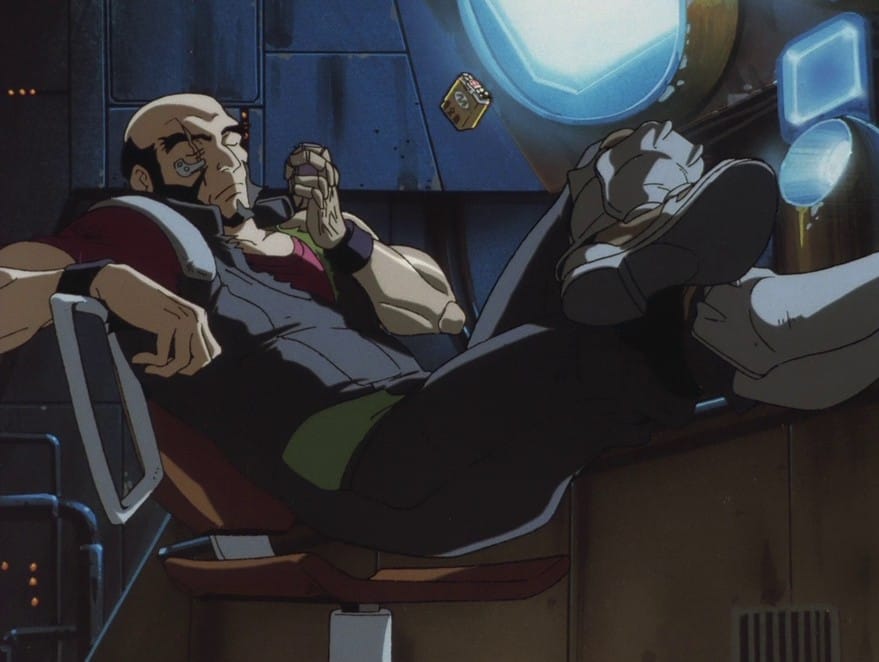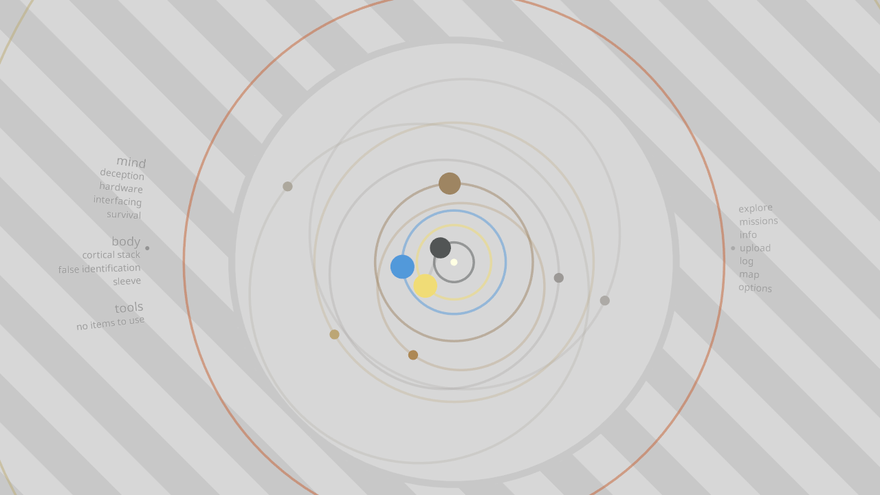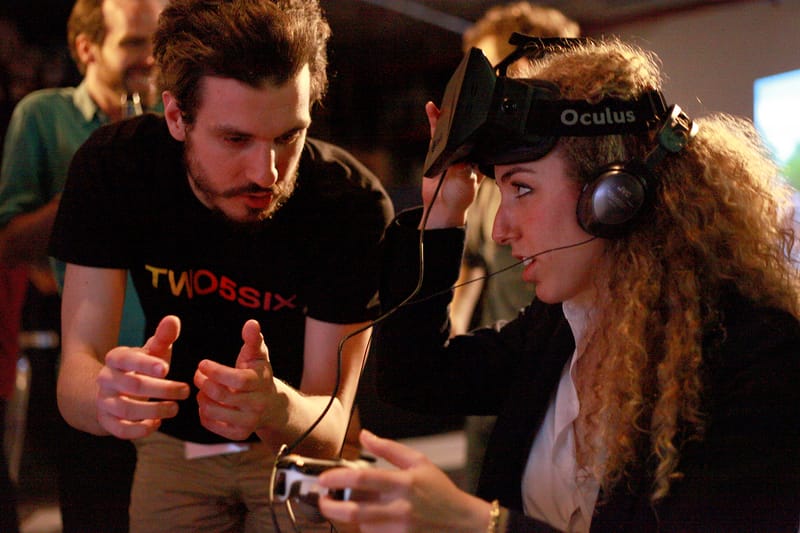On July 14 of this year, the New Horizons space probe flew within 7,800 miles of Pluto’s surface, allowing humanity to catch its first up-close glimpse of the Kuiper Belt’s most famous dwarf planet. The data sent back over the ensuing months at approximately 1 to 2 Kbps began to reveal a celestial object even more complex and beautiful than previously thought. High-resolution images enhanced with color data depicted a global surface rich with deep clay reds and creamy swirls of white. Further imaging of Pluto’s Sputnik Planum region during close approach uncovered hundreds of icy pits, hinting at a dynamic interplay between the planetoid’s frozen terrain and minimal atmosphere.
Despite giving us more information about Pluto, the pictures from New Horizons have had the effect of making it seem even more mysterious than before. The more we find out, the more we want to know. The minimalist science-fiction game Sun Dogs aims to draw on that same well of endless curiosity. But instead of using a picture to say a thousand words, it plans on using tens of thousands of words to paint a rich portrait of inter-planetary life.

“I want the player to feel like they are looking through a narrow window into a fully realized world, like there really are multitudes of experiences to be had there,” says the game’s creator, Nic Tringali. Designed as an open-world text adventure, Sun Dogs allows players to explore the solar system in a future where humanity has already spread across it and changed as a result. “From the sun’s corona to Neptune and beyond, humans have managed to adapt themselves to nearly every environment we’ve encountered,” Tringali explains on the game’s website.
As players complete quests and unravel new narrative threads, they’ll gain different items and abilities as well, including modifications to their textual bodies, which will then in turn “affect the text of the world and [their] journey through it.” Even if they die, their consciousness can live on in new bodies, situating life as a cycle within the game rather than as its punitive fail state. Beginning as a reference to Bruce Sterling’s Schismatrix, Tringali says the title, Sun Dogs, is also partly an allusion to game’s circular, refractive themes.
multitudes of experiences to be had
This loop of exploration and adaptation also mirrors in part how Sun Dogs was made. According to Tringali, “The process itself usually starts with real-world research, usually on physical characteristics of planets, refreshers on things like Dyson cylinders or space elevator constructions, orbital mechanics, anatomy, and things like that.” Then he takes what seems believable or of most potential interest to the player and works it into the game, refining and editing the existing text with each new iteration.
“Back when I was just pumping out text, I would stay within an entire space (such as a Lunar habitat, a city on Mars, etc.) and flesh it out completely,” says Tringali.
This meant visualizing as much as he could, exploring his imagined worlds mentally before he would render them textually. “A lot of the stuff is thinking out how the inner workings of something might work, whether it’s a synthetic arm, a city, how traffic moves around a planet.” A player might visit a new planet but need to negotiate with other lifeforms for space on a network or a spot in-line on the elevator to its surface. Encounters like these might go differently if the player is carrying different items or technological enhancements.

The game became so expansive that Tringali eventually brought on Rebecca McCarthy, currently working on Latency, to help with writing duties. Focusing mostly on building out Venus, McCarthy took her own inspirations for the world and its missions and funneled them into the larger game Tringali had already established. “In Sun Dogs, Venus is a center for organized crime,” she says, “so straight away there are elements of space gangsters, which for me evoked Cowboy Bebop and Gungrave anime.”
According to McCarthy, Sun Dogs’ Venus is also influenced by the artificial intelligences of Ken MacLeod’s Newton’s Wake and the cynicism of Revolution Software’s Beneath a Steel Sky. Some of its inspirations were more personal, however. “I drew on a lot more that just other media though, because we wanted Sun Dogs to have its own voice,” explains McCarthy. “So there are places in the game inspired by cafés and bars that I went to in Tokyo, or even childhood trips to the beach.”
But while Tringali and McCarthy created a detailed, mental scaffolding on which to place Sun Dogs, they want to emphasize the holistic feel of its solar system, recognizable and yet alien, familiar but futuristic, over the individual elements which explain it. “The game is about the world you’re in,” says Tringali, “and not necessarily any specific thing in it. Having it all in text makes it very easy to have the player interact with a lot of different things, and also let the player’s imagination fill in any gaps.”
Some of its inspirations were more personal
For instance, Tringali is afraid that each time he describes something in the game, like another entity appearing as a squid or bird or synthetic bundle of neurons, the player will be limited to those images in other encounters where such details aren’t made explicit. As a result, vagueness and ambiguity are their own virtues in Sun Dogs. As he explains on his developer’s blog, he wants the player’s mindset to remain open so that undefined details breed new possibilities instead of reverting to old defaults. “The best I can hope for is the player thinking ‘perhaps this person which is only vaguely described is not humanoid, or gender-binary, or X concept…'”
In this way, Sun Dogs eschews ornamental grandiosity. Its UI and visual layout are austere and elegant relative to the worlds it describes. Where other games might surrender their stories to bombastic action set-pieces, Tringali wanted to take space exploration to a quieter, more intimate scale. “You never shift the balance of power in any of the governments. There are no aliens or crazy creatures, and you certainly don’t save the world,” explains Tringali. “It’s mostly about small moments in this life you’re living.” Excerpts like, “You slide from the pod, your new sleeve is strangely unresponsive and takes extensive re-calibration before you are allowed to leave,” suggest the player will struggle enough with the mundane challenges of inhabiting her own body, while moments like “The Uralic Externality corporation underwent mitosis yesterday, but has not named its new sub-corps yet” are more akin to the background noise in a movie like Lost in Translation than an exposition dump in Halo.

The game’s approach to transhumanism plays off this humility. McCarthy says it was a quote from P.T. that stuck in her head the most while writing: “The only me is me. Are you sure the only you is you?” “We’ll probably never know what the meaning of that phrase is in regards to Silent Hills, but if you really break it down, it’s the words of someone asserting their own identity and then questioning the readers,” McCarthy says. Pulling on this thread led to questions about the agency of player-authored characters vs. pre-written ones. “I’m playing with words here a bit, but that’s what I hope people will do when playing the game,” she says. “There’s a lot of freedom to decide who you’re playing the game as; we don’t impose that on you.”
Tringali wants a similar opacity to permeate how Sun Dogs deals with the political consequences of transhumanism. “I’m not an unconditional fan of it,” he says. “Taken out of context, I think it’s pretty good, the idea of improving our bodies or environments to suit our needs.” On a larger, more realistic scale, however, Tringali can see the potential conflicts. A society filled with perfect half-robotic humans of altered genetics and ‘normal’ humans, with the problems of inequal human systems, is something I try to keep in mind,” he explains. “I don’t want to create a utopia or a dystopia, just a believable place where humans exist.” And this makes sense given our present obsession with identity and equality. Just as technological breakthroughs seem to complicate questions about “haves” and “have-nots” rather than resolve them, a future immeshed in the nuances of a non-human-centric point-of-view would no doubt make for richer avenues of exploration than a science fiction parable steeped in black and white answers.
Sun Dogs is set to release on Steam on October 30, 2015. You can find out more about the game on Nic Tringali’s website.





